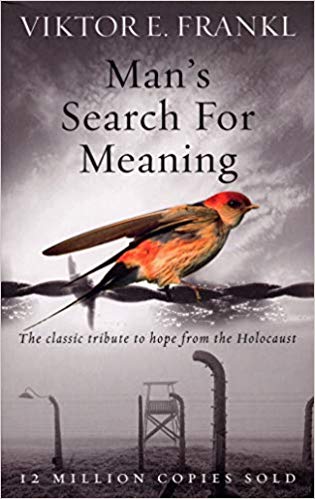Book Summary: Man’s Search for Meaning by Viktor Frankl
Psychiatrist Viktor Frankl’s memoir has riveted generations of readers with its descriptions of life in Nazi death camps and its lessons for spiritual survival. Between 1942 and 1945 Frankl labored in four different camps, including Auschwitz, while his parents, brother, and pregnant wife perished. Based on his own experience and the experiences of others he treated later in his practice, Frankl argues that we cannot avoid suffering but we can choose how to cope with it, find meaning in it, and move forward with renewed purpose. Frankl’s theory-known as logotherapy, from the Greek word logos (“meaning”)-holds that our primary drive in life is not pleasure, as Freud maintained, but the discovery and pursuit of what we personally find meaningful.
“But there was no need to be ashamed of tears, for tears bore witness that a man had the greatest of courage, the courage to suffer.”
At the time of Frankl’s death in 1997, Man’s Search for Meaning had sold more than 10 million copies in twenty-four languages. A 1991 reader survey for the Library of Congress that asked readers to name a “book that made a difference in your life” found Man’s Search for Meaning among the ten most influential books in America.
Book Review: Man’s Search for Meaning by Viktor Frankl
Man’s Search for Meaning is written by a psychologist who survived several Nazi concentration camps and on his journey observed all the different reactions, choices and mindsets of people who survived WWII and those who didn’t. The big idea of the book is that anyone can choose to make meaning out of any situation, no matter how bad thing are. He uses his personal experiences and observations from Auschwitz as an example.
“When we are no longer able to change a situation, we are challenged to change ourselves.”
Man’s Search for Meaning by Viktor Frankl is a memoir that should be read by everyone at least once, it’s a classic must-read, and one of the most influential books written in America. With its descriptions of life in Nazi death camps, it’s certainly a difficult & painful read; but the lessons for spiritual survival are deeply profound which you can apply to your life.
“Everything can be taken from a man but one thing: the last of the human freedoms—to choose one’s attitude in any given set of circumstances, to choose one’s own way.”
Between 1942 and 1945 Frankl labored in four different camps, including Auschwitz, while losing everything he had, including his loved ones. There were many times when he wanted to give up, and Viktor Frankl and his fellow prisoners had to endure atrocities that many of us cannot even imagine. But throughout the book, Frankl speaks deeply about his own “why” and pursuit of meaning which helped him endure his difficult circumstances. Viktor Frankl argues that we cannot avoid suffering but we can choose how to cope with it, find meaning in it, and move forward with renewed purpose. Frankl’s theory known as logotherapy, from the Greek word logos (“meaning”), holds that our primary drive in life is not pleasure, but the discovery and pursuit of what we personally find meaningful.
“Those who have a ‘why’ to live, can bear with almost any ‘how’.”
I find Man’s Search for Meaning by Viktor Frankl extremely hopeful, that as human beings, we have the ability to rise above all sufferings, to find our own individual meaning to our existence and in that way make sense of why we are in this world, and why we should continue in it, doing our very best. If you’re going through tough time, remember that, it may take time to realize it, but you’re loved, worthy, and a fighter. God put all of us on this earth because he loves us, he gave you a gift to use, and purpose to live for.
Importantly, take care of yourself, mentally, physically, and spiritually. We live in a hyper-connected, busy society where it’s easy to get lost, overwhelmed, and compare yourself to others constantly. It’s all about you, you have to put yourself before others. Live the life that that makes you happy, not to impress others. Don’t let the petty, little, vain things get in your way.





